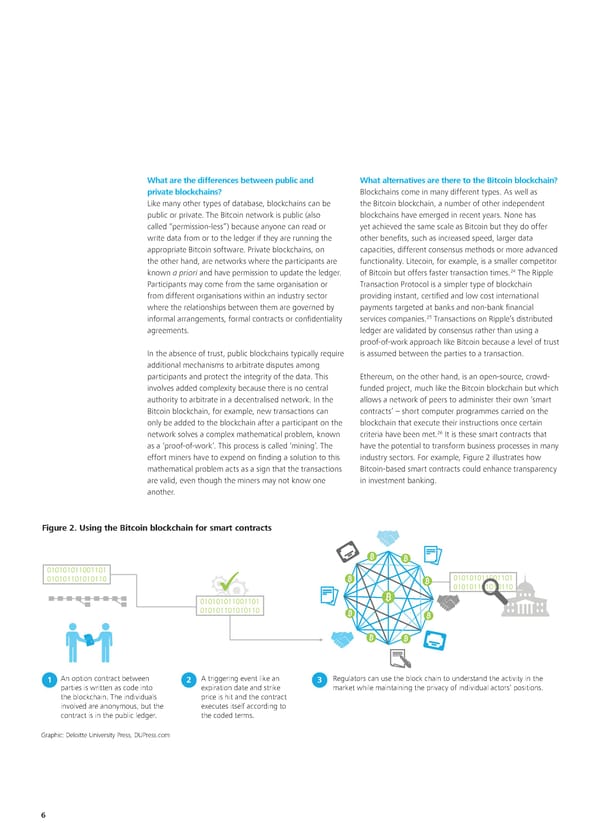To start a new section, hold down the apple+shift keys and click to release this object and type the section title in the box below. What are the differences between public and What alternatives are there to the Bitcoin blockchain? private blockchains? Blockchains come in many different types. As well as Like many other types of database, blockchains can be the Bitcoin blockchain, a number of other independent public or private. The Bitcoin network is public (also blockchains have emerged in recent years. None has called “permission-less”) because anyone can read or yet achieved the same scale as Bitcoin but they do offer write data from or to the ledger if they are running the other benefits, such as increased speed, larger data appropriate Bitcoin software. Private blockchains, on capacities, different consensus methods or more advanced the other hand, are networks where the participants are functionality. Litecoin, for example, is a smaller competitor known a priori and have permission to update the ledger. of Bitcoin but offers faster transaction times.24 The Ripple Participants may come from the same organisation or Transaction Protocol is a simpler type of blockchain from different organisations within an industry sector providing instant, certified and low cost international where the relationships between them are governed by payments targeted at banks and non-bank financial 25 informal arrangements, formal contracts or confidentiality services companies. Transactions on Ripple’s distributed agreements. ledger are validated by consensus rather than using a proof-of-work approach like Bitcoin because a level of trust In the absence of trust, public blockchains typically require is assumed between the parties to a transaction. additional mechanisms to arbitrate disputes among participants and protect the integrity of the data. This Ethereum, on the other hand, is an open-source, crowd- involves added complexity because there is no central funded project, much like the Bitcoin blockchain but which authority to arbitrate in a decentralised network. In the allows a network of peers to administer their own ‘smart Bitcoin blockchain, for example, new transactions can contracts’ – short computer programmes carried on the only be added to the blockchain after a participant on the blockchain that execute their instructions once certain network solves a complex mathematical problem, known criteria have been met.26 It is these smart contracts that as a ‘proof-of-work’. This process is called ‘mining’. The have the potential to transform business processes in many effort miners have to expend on finding a solution to this industry sectors. For example, Figure 2 illustrates how mathematical problem acts as a sign that the transactions Bitcoin-based smart contracts could enhance transparency are valid, even though the miners may not know one in investment banking. another. Figure 2. Using the Bitcoin blockchain for smart contracts 1 An option contract between 2 A triggering event like an 3 egulators can use the block chain to understand the activity in the parties is written as code into epiration date and strike market while maintaining the privacy o individual actors’ positions. the blockchain. The individuals price is hit and the contract involved are anonymous, but the eecutes itsel according to contract is in the public ledger. the coded terms. Graphic: Deloitte University Press, DUPress.com 6
 Blockchains: Enigma. Paradox. Opportunity. Page 7 Page 9
Blockchains: Enigma. Paradox. Opportunity. Page 7 Page 9